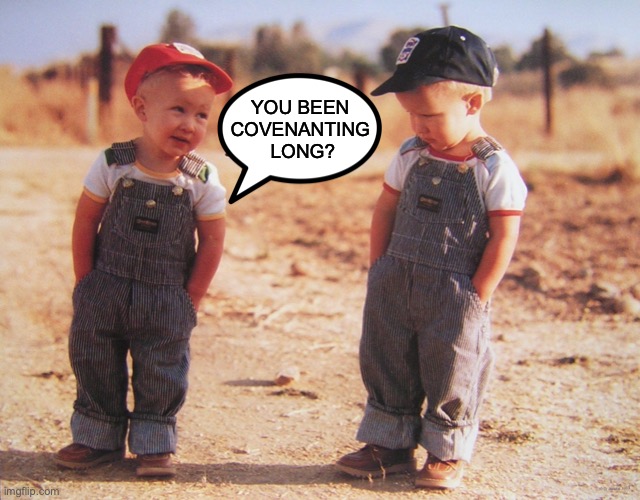Everyone is agreed that Abraham’s children were members of the covenant God made with him. Genesis 17:7 makes that much plain, “And I will establish my covenant between me and thee and thy seed after thee in their generations for an everlasting covenant, to be a God unto thee, and to thy seed after thee.” Now, this covenant was one in which God promised to be God to him, as well as his shield and reward (Genesis 15:1). These promises were covenanted to the children, and the whole matter was made plain and clear with a covenant sign: This is my covenant, which ye shall keep, between me and you and thy seed after thee; Every man child among you shall be circumcised. And ye shall circumcise the flesh of your foreskin; and it shall be a token of the covenant betwixt me and you.”
But, many claim that the new covenant is so unlike the Abrahamic covenant that the natural children are no longer included as members. This argument is that there was a genealogical principle in the Abrahamic covenant that does not carry over to the New Covenant. The chief text of Scripture supplied as support for this claim is Jeremiah 31:31-34. God says through the prophet—
“Behold, the days come, saith the Lord, That I will make a new covenant with the house of Israel, and with the house of Judah: Not according to the covenant that I made with their fathers In the day that I took them by the hand To bring them out of the land of Egypt; Which my covenant they brake, Although I was an husband unto them, saith the Lord: But this shall be the covenant that I will make with the house of Israel; After those days, saith the Lord, I will put my law in their inward parts, And write it in their hearts; And will be their God, And they shall be my people. And they shall teach no more every man his neighbour, and every man his brother, saying, Know the Lord: For they shall all know me, From the least of them unto the greatest of them, saith the Lord: For I will forgive their iniquity, And I will remember their sin no more.”
The argument then runs as follows. The Old Covenant which God made with Abraham and Israel included natural children and Israel broke that covenant. The New Covenant will be different in that it is not made with natural children but spiritual children (only those who are regenerated unto saving faith) and thus it will not be broken as the Old. Moreover, there will be no need for every man to tell his brother to know the LORD for each and every one in this New Covenant is regenerated unto saving faith. There are no unregenerate covenant members in the New Covenant as there was in the Old back in the days of Abraham, Moses, and David.
Not only can I see how someone could hold to this line of thinking, I myself did hold to it for some time, albeit with a variety of modifications, clarifications, and attendant arguments. Indeed for me making points like the one in this post is an exercise in what Chesterton once said: “If this book is a joke it is a joke against me. I am the man who with the utmost daring discovered what had been discovered before. . . . No one can think my case more ludicrous than I think it myself; no reader can accuse me here of trying to make a fool of him: I am the fool of this story, and no rebel shall hurl me from my throne.”[1]
Indeed for some time, I considered the various biblical promises God made to His people’s children in the Old Testament as promises God made to Israel and their offspring and in some general sense similar promises were made to New Covenant members and their offspring. I could not say with confidence that they were covenant promises from God to covenant children in the New Covenant for I was convinced that New Covenant membership necessitated regeneration. I was not prepared to claim the active regeneration of my infant so I was not ready to recognize either their New Covenant membership nor the biblical promises above as being vouchsafed to them by Christ’s blood. I took these promises as announced to the Christian’s children, even promises made to such children in a special way given their presence in a Christian home. But I did not take them as promises stuck to them, promises from God signed and sealed upon them. But that is what they are. They are not promises potentially made to your seed or promises merely announced like a general gospel call to the world. They are promises covenantally made, indeed, promises vouchsafed to your children by the blood of Christ. They are sworn oaths of blessing made to your children in a particular way for they are covenant children and the promises are to them, and fulfilled by faith.
But what about the Jeremiah 31 objection above? I believe the objection I detailed above simply straps too much on the back of Jeremiah. He is a strong prophet, but if we load the stated objection on his shoulders, then we weigh him down with more of an argument than he can bear. Really, we must take it easier on him. The objection claims that Jeremiah 31 proves that each and every New Covenant member is regenerate at this very moment when Jeremiah’s point is that the New Covenant will be better than the Old. Particularly, the New Covenant will be better in that it will not be broken as the Old was, it consists of God’s law being written on the heart of his covenant people, and it will be far more efficacious and potent in the lives of the covenant people.
Broken
Regarding the New Covenant not being broken, Jeremiah’s point is not that an individual covenant member cannot break covenant with God in the New Covenant. Rather, his point is that the New Covenant itself will not be broken. The Old Covenant as a whole was broken such that it came to an end (2 Cor. 3:11). Think of the administration of the new covenant like a presidential administration, say the Washington or Jefferson administration. Jeremiah is not saying that a card-carrying member of the Jefferson administration cannot resign his membership and leave it. He is saying that administration itself is never going to fade away like the old one did.
On the Heart
Concerning God’s law written on the heart in the New Covenant, Jeremiah speaks to the degree of the Spirit’s power and efficaciousness upon the New Covenant people. He does not imply that the saints under the old administration of the covenant of grace were saved without the work of the Spirit upon the heart. Calvin, for example, writes, “A question may however be here moved, Was the grace of regeneration wanting to the Fathers under the Law? But this is quite preposterous.”[2] He places the difference not as to the substance of the Spirit, but the form or degree of the Spirit—“Then we know that this grace of God was rare and little known under the Law; but that under the Gospel the gifts of the Spirit have been more abundantly poured forth, and that God has dealt more bountifully with his Church.”[3]
Calvin tracks with this distinction between substance and form throughout his exegesis:
“He afterwards says, I will put my Law in their inward parts. By these words he confirms what we have said, that the newness, which he before mentioned, was not so as to the substance, but as to the form only: for God does not say here, ‘I will give you another Law,’ but I will write my Law, that is, the same Law, which had formerly been delivered to the Fathers. He then does not promise anything different as to the essence of the doctrine, but he makes the difference to be in the form only.”[4]
In other words, whether you believe there is one covenant of grace in substance which has undergone a significant renovation in form and structure with the coming of Christ, or you believe there has been two separate covenants, the old housing the natural family and the new merely individuals who are marked by active regeneration, makes a big difference.
Shall All Know Me
The greater efficaciousness and potency of the New Covenant is seen in Jeremiah’s language—“they shall teach no more every man his neighbour, and every man his brother, saying, ‘Know the Lord’” (Jer. 31:34). Jeremiah here speaks hyperbolically. His point is not that the substance of the New Covenant is different such that each and every New Covenant member is regenerate, opposed to the Old when that was not the case. Rather, Jeremiah amplifies the point that the New Covenant manifests God and his truth far more brightly than the Old.
Again, Calvin writes, “Here is mentioned another difference between the old and the new covenant, even that God, who had obscurely manifested himself under the Law, would send forth a fuller light, so that the knowledge of him would be commonly enjoyed. But he hyperbolically extols this favour, when he says that no one would have need of a teacher or instructor, as every one would have himself sufficient knowledge. We therefore consider that the object of the Prophet is mainly to shew, that so great would be the light of the Gospel, that it would be clearly evident, that God under it deals more bountifully with his people, because its truth shines forth as the sun at noon-day.”[5]
Indeed, God deals more bountifully with his covenant people in the New Covenant, not less bountifully. The fact that God told Abraham to place the sign of the covenant upon his children is a testimony that his children were included in God’s covenant with him. Does it not stand to reason that in the more bountiful covenant, the children would likewise be included?
[1] G. K. Chesterton, Orthodoxy (Chicago, IL: Moody Publishers, 2009), 23.
[2] John Calvin and John Owen, Commentaries on the Prophet Jeremiah and the Lamentations, vol. 4 (Bellingham, WA: Logos Bible Software, 2010), 131.
[3] Ibid., 131.
[4] Ibid., 131–32.
[5] Ibid., 134.




